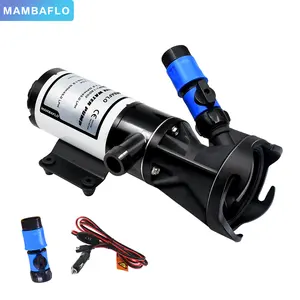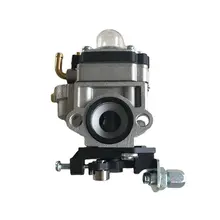What are Marine Pumps
Marine pumps are specialized devices designed for the demanding conditions of marine environments. These pumps are essential for a variety of applications, from the handling of ballast water in ships to ensuring the proper functioning of cooling systems, and from managing waste efficiently to facilitating fuel transfer. They are built to withstand the corrosive nature of seawater and to operate reliably under continuous use, often in confined spaces where durability and compactness are crucial.
The primary users of marine pumps include shipping companies, fishing fleets, naval vessels, and the offshore industry. Each sector has its specific needs, but all benefit from the robustness and efficiency of marine pumps in their daily operations. The principles on which these pumps work depend on their type but generally involve creating a pressure difference to move fluids. For instance, centrifugal pumps use a rotating impeller to impart velocity to liquid, converting that velocity into flow. Positive displacement pumps, on the other hand, trap a fixed amount of fluid then force it through the discharge pipe.
Marine pumps must also be adaptable to various tasks aboard vessels or rigs. This adaptability includes handling different types of fluids ranging from freshwater, fuel, and oil to sewage and bilge water. Their construction materials must resist corrosion from saltwater and harsh marine conditions while maintaining performance integrity.
Types of Marine Pumps
The variety of tasks performed in marine applications necessitates a diverse assortment of pump types. Each type serves specific purposes:
Centrifugal Pump: This is the most common type found on vessels for general pumping duties including ballast transfer, firefighting, and cooling water circulation. Using rotational kinetic energy from an impeller, it moves fluid by converting rotational energy into hydrodynamic energy.
Positive Displacement Pump: These are typically used when a consistent flow rate is needed regardless of the pressure, making them suitable for fuel or oil transfer operations. They work by trapping a fixed amount of fluid then forcing it through the discharge pipe.
Submersible Pump: Often used for bilge pumping, submersible pumps are designed to operate while submerged in water. They're efficient for drainage and can handle a variety of liquids including sewage.
Diaphragm Pump: With its ability to handle sludges and slurries with ease, the diaphragm pump is often employed in waste management systems aboard ships.
Gear Pump: Utilized primarily for pumping oil or other high viscosity fluids, gear pumps operate by passing fluid between gears to create a smooth flow.
These pumps serve as critical components in systems ranging from engine cooling to cargo loading and unloading.
How to choose Marine Pumps
Selecting the right marine pump is vital for ensuring efficient operations at sea. When choosing a pump for marine applications, consider the following factors:
Fluid Characteristics: The type of fluid being pumped (e.g., water, oil, sewage) will dictate the material construction required for durability and compatibility.
Flow Rate and Pressure Requirements: Determine the necessary flow rate and pressure output based on the application's demands. High-pressure pumps may be needed for firefighting systems, while lower pressure may suffice for bilge water removal.
Power Source: Consider whether an electric or engine-driven pump best suits your application; also note if solar power is a viable option.
Installation Environment: Ensure that the chosen pump can withstand the harsh marine environment and fits within the spatial constraints of your vessel or offshore setup.
Customization Needs: If your operation requires specific modifications or custom designs (ODM or OBM), seek out suppliers that offer these services.
By considering these factors against your operational requirements, you can make an informed decision that ensures reliability and effectiveness in your marine applications.
Best Marine Pumps on Alibaba.com
Alibaba.com stands out as a global marketplace where businesses can source an extensive range of marine pumps designed for various applications across the maritime industry. With options available from numerous suppliers worldwide, Alibaba.com provides access to a broad spectrum of products catering to different needs and specifications. Whether you're looking for high-pressure pumps for firefighting systems on board ships or need submersible pumps for effective bilge water management, Alibaba.com's platform facilitates an easy search with customizable filters to match your exact requirements.
The platform's commitment to connecting global buyers with reputable suppliers ensures that businesses can find marine pumps built with materials that withstand corrosive sea environments while ensuring performance and durability. With features such as Trade Assurance, buyers have peace of mind knowing their transactions are secure and their orders will be fulfilled as expected. Furthermore, Alibaba.com's user-friendly interface allows buyers to communicate with suppliers directly, ensuring any custom requirements are accurately conveyed and met.
For businesses aiming at efficiency without compromising on quality or reliability, Alibaba.com offers a diverse selection of marine pumps along with detailed information about each product. This transparency ensures buyers can make knowledgeable decisions tailored to their operational needs while benefiting from competitive pricing due to Alibaba's B2B wholesale model. Whether running a commercial shipping operation or supplying equipment for maritime industries, Alibaba.com is an indispensable resource for sourcing marine pumps that meet stringent industry standards.
Common FAQs for Marine Pumps
What types of marine pumps are available for different applications?
There are several types of marine pumps available designed to cater to various applications, including centrifugal pumps, positive displacement pumps, submersible pumps, diaphragm pumps, and gear pumps. Each has its own specific use case aboard ships and offshore installations.
How do I determine the correct size of a marine pump for my vessel?
To determine the correct size of a marine pump, you need to assess the flow rate requirement, the head pressure needed, and the characteristics of the fluid being pumped. It is essential to match these factors with the pump's specifications to ensure efficient operation.
What materials are commonly used in the construction of marine pumps?
Marine pumps are typically made from materials that offer corrosion resistance and durability, such as stainless steel or cast iron. The choice of material depends on the type of fluid being pumped and the operating environment.
Are there specific marine pumps for handling corrosive or high-viscosity liquids?
Yes, certain marine pumps like gear pumps for high-viscosity liquids and specific corrosion-resistant pumps are made for handling corrosive liquids. It's important to choose a pump that's suitable for the chemical properties of the fluid.
Can marine pumps be customized to fit unique requirements?
Many suppliers offer customized support such as Original Design Manufacturing (ODM) or Original Brand Manufacturing (OBM) to fit unique operational requirements or spatial constraints on vessels.
What power sources are available for marine pumps?
Marine pumps can be powered by electricity, engines, or even solar power. The selection of a power source depends on the availability and practicality within the specific application.
How does a positive displacement pump differ from a centrifugal pump in marine applications?
A positive displacement pump delivers a consistent flow rate regardless of pressure conditions and is ideal for transferring fuel or oil. In contrast, a centrifugal pump is commonly used for general water pumping duties where variable flow rates are acceptable.
What should I consider when choosing a marine pump for wastewater treatment on my ship?
When selecting a marine pump for wastewater treatment, consider factors such as the ability to handle solids, chemical compatibility with sewage, required flow rate, and ease of maintenance.
Is energy efficiency an important factor in selecting a marine pump?
Energy efficiency is an important consideration as it affects operational costs and environmental impact. Pumps with features like high efficiency and energy-saving capabilities should be prioritized for long-term benefits.
How do I ensure that the marine pump I choose will be durable under harsh sea conditions?
To ensure durability, select marine pumps that are specifically designed with robust materials suitable for maritime environments and that have features like corrosion resistance and sturdy construction.
What measures can be taken to reduce noise levels in marine pumps?
To reduce noise levels in marine pumps, look for features such as low-noise design and vibration dampening materials. Additionally, proper installation and regular maintenance can help minimize noise.
Are there any submersible marine pumps that offer high-efficiency performance?
Yes, there are high-efficiency submersible marine pumps available that are designed to operate efficiently while submerged in water, which are ideal for drainage and bilge water management.
Can solar-powered marine pumps provide enough power for large-scale operations?
Solar-powered marine pumps can provide sufficient power for certain operations but may not be suitable for large-scale applications where consistent and high-power output is essential. The feasibility depends on factors such as sunlight availability and energy storage capacity.
What kind of maintenance is required for marine pumps?
Regular maintenance for marine pumps typically includes inspection for wear and damage, lubrication of moving parts, checking seals and gaskets for leaks, and cleaning to prevent clogging or corrosion.











































 浙公网安备 33010002000092号
浙公网安备 33010002000092号 浙B2-20120091-4
浙B2-20120091-4